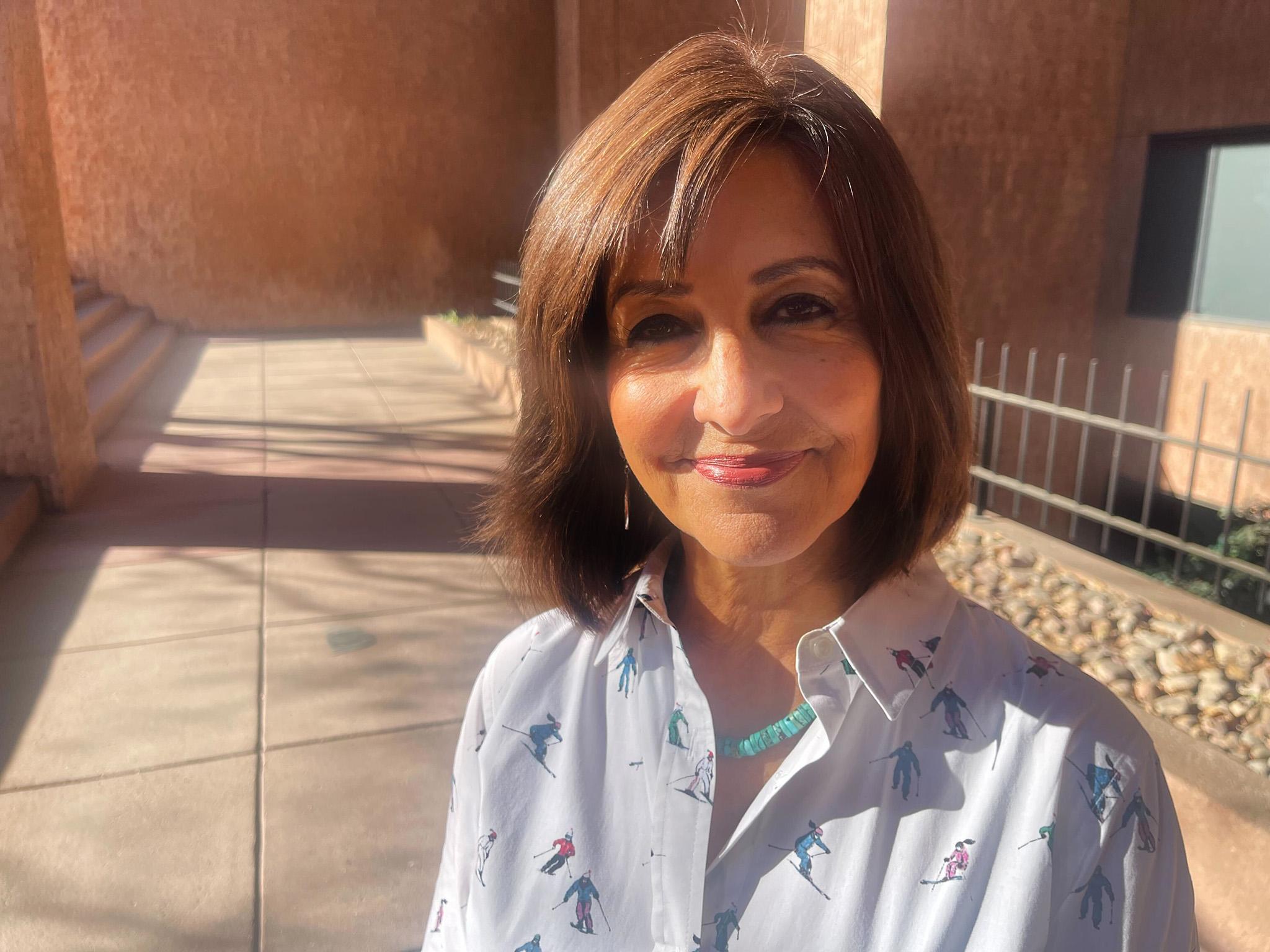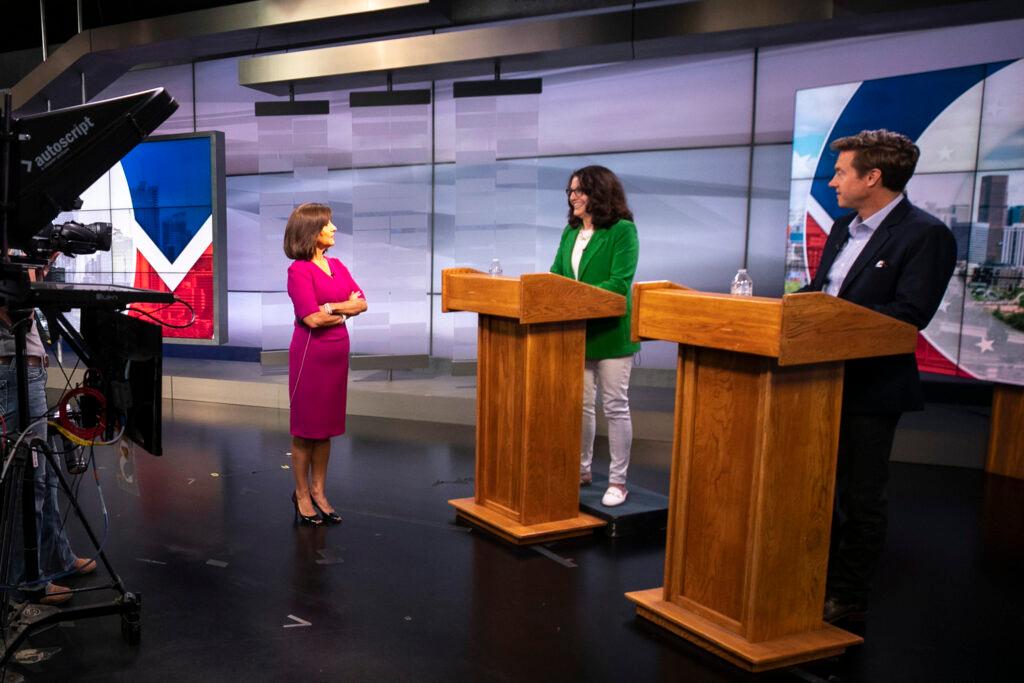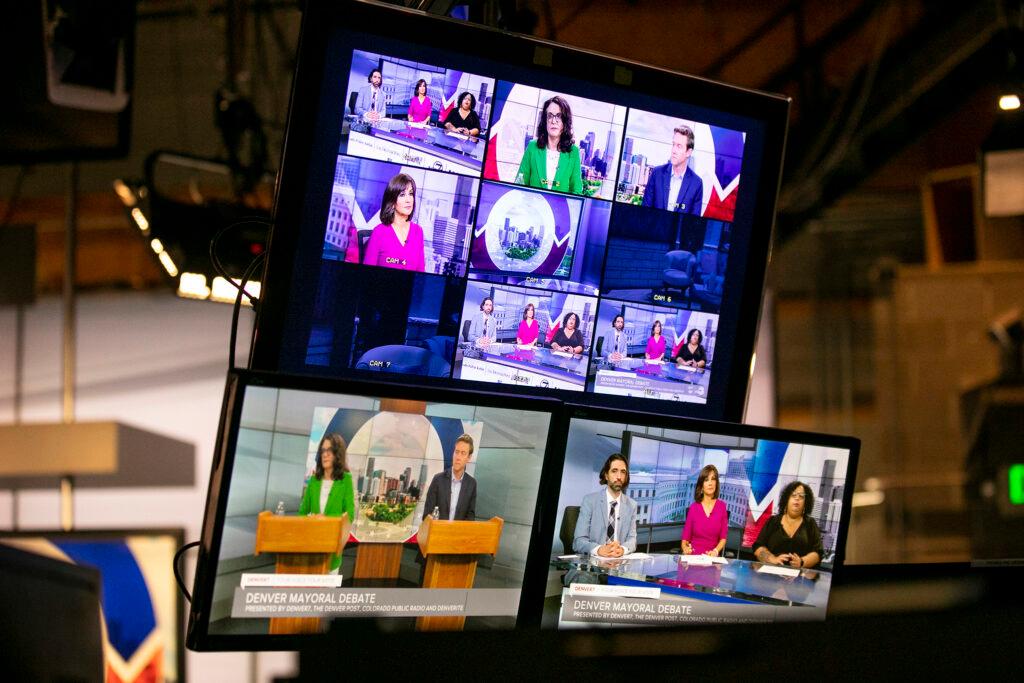
You know you have led a meaningful career when, upon retiring, the state declares a day in your honor. Well, November 16 will forever be Anne Trujillo Day in Colorado– in honor of the longest-serving evening news anchor here.
Since Trujillo signed off from Denver7 this month, there have been a slew of retrospectives in the press (including the newspaper where she started). For Colorado Matters, Trujillo agreed to answer questions about her inner life, and the tools she’s honed personally and professionally that we all might benefit from.
This interview transcript has been edited for length and clarity.
Ryan Warner: Television is designed to look good– the sets, the lighting, the makeup. It's why I'm particularly interested in talking to you about the blemishes, the figurative blemishes. So many people I know, who are at the top of their game, deal with imposter syndrome, this idea that they don't belong and they're somehow faking their way through. As a journalist who contends with that myself, I'm eager to know if you did. Does that resonate?
It used to be something I would think about. And I read an article recently that said, "Get rid of that phrase, imposter syndrome." The world needs to make space for people who are maybe not someone who looks like those who have been the decision-makers, or those who have been in charge all of these years.
It is time that the world starts to adapt and change and know that there are people with differences of opinions or looks or socioeconomic level, whatever those differences are, that the world needs to start changing. And so I had decided not all that long ago that I was going to not even consider imposter syndrome. Because I think growing up I felt like I didn't wholly fit in, in a lot of scenarios. And it took me a while. I think it's just maturity over the years to kind of go, "No, somebody else needs to change. I'm moving into this space."
What was ‘this space’ early on? You grew up in Littleton, went to Littleton High School.
Well, growing up in Littleton, we were one of very few families of color. We moved here when I was in the middle of my sixth-grade year. And I remember having a conversation with my parents at the time. We had moved here and they said, "We can move to Denver and be around people who we're comfortable with, who we look like, who speak Spanglish, who we know." And at that time, Denver was going through a tough time with its schools. So my dad moved us here because he went to work for (the defense contractor) Martin Marietta. And my parents said, "Or we can move to Littleton where we know the schools are good. We know that I will be closer to my job." And we had a family meeting and we decided we're going to try Littleton. And so that was probably my first taste of, "Huh. We look a little different in this community."
What is an instance that stands out in your mind from that time in Littleton as you were adjusting? Or to make reference to what you said earlier, as people were adjusting to you?
Exactly. I vividly remember walking down the street in my neighborhood one time and someone calling me the N-word. And I remember laughing about it, thinking, "Oh, they don't know me. They don't know anything about me." My high school counselor told me I needed to go to a trade school, that I wasn't college material. And I remember she was consulting with other students– helping other students figure out their career paths. And I wasn't one of those. And I knew I wasn't any different.
And so when a counselor says, "I think trade school's the right path," and by the way, absolutely nothing wrong with trade school.
Of course. Of course.
But for a counselor to be shutting down opportunities.
Exactly.
And not having the conversation, that's a problem. You had the self-awareness to say-
I didn't have a choice. My parents said, "You are going to college." They didn't have the opportunity to go. And they said to us, "You are going to college."
Did you know you wanted to be a journalist by that point?
No. I will say that my very first job was at the Littleton Independent, the newspaper which is on Main Street in downtown Littleton. And I was an errand girl. I didn't do much of anything related to journalism, but that was certainly my first introduction to journalism.

Early in a career, mistakes are inevitable. Sometimes they're embarrassing. Would you talk about a mistake you made at the start of your journalism career, and what you learned from it?
I can't even tell you how many mistakes I made. My very first TV job was in Scottsbluff, Neb., and I didn't know how to do anything. They hired me and I went to this newsroom and the mistakes were many. And I still make mistakes. I could probably tell you a few from last week because it's just always a work in progress.
And I think that's part of being a journalist. You always look back and say, "I should have said this. I should have changed that word. I should have changed that sentence. What was I thinking at that time?" Because it's always should have, would have, could have, right?
Yes. This notion that it's always a work in progress, it's comforting to hear that from Colorado's longest-serving anchor. And I suppose, if you lost that feeling, that would be a red flag like, “Maybe I should get out of this business.”
I think you're right. I think that the reality about working in news is yes, you have to meet deadlines and it's not always perfect, but we try. And yes, we make mistakes. And I think a lot of us walk out of there beating ourselves up saying, "Why did I say that?" Or, "Why did I choose that word? I wish I had two more minutes to be able to change that. I would've said it a little bit differently." You just do that in your profession. So yes, if I had lost that, I think that would've been a tragedy.
And when members of the audience write in, they can be cruel, but sometimes they're never as cruel as the internal voice that beats you up after the missed chosen word.
I think the hardest time I would ever have is just going home and not turning my brain off because of the would have, could have, should have.
What have you learned about constructive criticism? And maybe you could share both taking it and giving it.
I think the taking part is who you're listening to. I have learned it needs to be from someone who I respect and I will listen to, and I will take it. And if it's someone who (not that I want to disregard anyone's opinions), but there are people out there who don't fully understand what it takes to do our jobs, right? That I will take it with a grain of salt and say, "Thank you. I appreciate you writing in. Thank you so much."
Consider the source.
Exactly. Exactly.
What about giving constructive criticism? There are any number of, I'm sure younger journalists who have come up in the Denver7 newsroom.
I have a lot of fellow journalists, although all of them are easily half my age and younger. And I love when they have said to me, especially recently, "I have your voice in my head, what would Anne do?" And so that made me feel good, Ryan, that I was leaving and knowing that I had an impact and hopefully not in an offensive way. But I just knew that there were times when I needed to have my voice to be the loudest one in the room, which is not really my style typically, but there are times when you just need to speak up when you're the veteran in a newsroom.
How do you approach that?
It was one of my last newscasts, and I even said to one of our producers, "Is this the best story we have tonight to lead our newscast? Have you thought about..." whatever, fill in the blanks. And that's typically one of the phrases I would use.
I also like that it’s a question. It's not, "This is a crappy lead."
Right. Because I think in a newsroom you have to have those conversations. You can't just let it be one person's decision. It has to be all of us collectively thinking about what it is that is most important to our viewers.
You had to interview, corral maybe, some very powerful people over the years. Were there techniques you used to psych yourself up?
Well, you and I did a debate together.
Yeah, I remember that.
And those are always the most stressful situations ever for me. I was nervous.
I did not sense that. I looked to you and I thought, "I'm just going to be like this stalwart." Were there things you were telling yourself before air or as we were honing questions? Is there self-talk that was helpful before an event like that?
I think when you have a group of journalists in the same room, which we did on a regular basis before that debate, and you list all of the possibilities of topics and questions and you remember, we reworked those questions 50 times and we changed one word here and there. And it does come down to one word sometimes. So it's just what is most important to the people of Colorado? What do they really care about? That was always what was in my head.
Well, I also hear you saying an antidote to fear is preparation. Knowing your stuff.
Oh, absolutely. And never feeling like you know enough.

How much of your identity is tied up in being on television? And is not being on TV going to require some adjustment?
Oh, I have loved my job. I have always felt like I've been very grounded about who I am and my presence on television is not everything to me. Honestly, I look forward to not wearing fake eyelashes anymore. Not wearing makeup all the time. If you see me at Costco, I will go and I will be in my jeans and tennis shoes and a T-shirt and no makeup. I'm good with being Anne Trujillo not on television.
Do you think that was always true, or did you have to develop that? Not to turn this into a therapy session where you're my therapist, but there's something fulfilling about being recognized and having your work recognized, and it can be addictive.
Right. I think it's lovely that people have come to know me and trust in me. I feel so honored by that. I know there are a lot of people out there who relish being on television, and I don't think I'm one of those. And at the same time, I'm not going to lie, I did. And I believe in mental health care. So there was a time, maybe about a year ago, that I consulted with a therapist to say, "I just want to make sure that I don't feel traumatized." I want to figure out how to disconnect fully so I don't feel exactly what you're describing. And so we had a couple of sessions.
This was in preparation for retirement?
In preparation for my departure, absolutely. Because I wanted to make sure that I wasn't going to be a "What do I do with my life now? What happens when people don't recognize me? I fully understand that it's kind of an out-of-sight, out-of-mind kind of thing, and I'm okay with that. I'm ready for this next phase of my life.
Finally, speak to young people. Is a television news career a good idea now?
That's a loaded question because I think that the business has changed a lot over the years and there is nothing glamorous about it honestly. You have to love journalism to work in TV news because the demands are great. The hours are lousy.
I still will have people ask me to this day, "Who does your hair? Who does your makeup?" I do. I do all of that. And sometimes it's with about two minutes to spare because I've been hammering away on my computer trying to get ready for a newscast, and I look at the clock and I go, "Oh my gosh, I’ve got to get downstairs right now to the set." And I will very quickly put a little powder on my face. So there's nothing glamorous about it. And whatever people have watched over the years about how it comes together, it sometimes is yeah, superglued together at the last minute.
I think what you're saying is there was a time in television news where if you were more in it for the glamor… that time has passed.
Well, and not only that. Honestly, the people who sit down and watch TV news right now are probably 40, 50 on up. The younger generation is looking for everything on their phones. Truthfully, if I am recognized anymore, it's generally someone my age and older, right? You learn that you have to have all of the tools available to you with social media and your phone, and shooting a story or hitting any platform that you can to be able to get your message out.
And it's not so much about name recognition anymore, even though some people will focus on that. But it's more about getting the information out there on whatever platform you can get it out there.
Does that make you think you're leaving just in time?
Yes.
- Interview: The CEO of DIA answers your questions (and more), from long lines and construction to holiday travel woes
- Interview: Colorado’s population trends are on a collision course with the state’s housing shortage
- Interview: Colorado Springs Mayor Yemi Mobolade on his journey to the U.S., the American Dream, and finding ‘the real Yemi’









